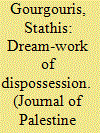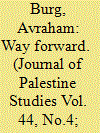|
|
|
Sort Order |
|
|
|
Items / Page
|
|
|
|
|
|
|
| Srl | Item |
| 1 |
ID:
141326


|
|
|
|
|
| Summary/Abstract |
Essentially a cinema of occupation and dispossession, Palestinian cinema disrupts standard notions of national cinema, complicating conventional expectations of national aesthetics or national dreams. As the borders of Palestine’s historical territory are continuously under erasure, so too are the symbolic boundaries of its language, which is flexible and inventive; the language of Palestinian cinema is a limit-language. No one has expressed this “limit condition” more succinctly than Elia Suleiman, whose cinematic language exemplifies a poetics of dispossession that depicts the asphyxiating spaces and truncated temporalities of Palestinian life with tragic humor and bold fantasy in defiance of narrative simplicity. Suleiman’s films run counter to the conventional representation of Palestinian existence and are arguably the sharpest expressions of what can be deemed to be the dream-work of that existence against its conventional representation.
|
|
|
|
|
|
|
|
|
|
|
|
|
|
|
|
| 2 |
ID:
141325


|
|
|
|
|
| Summary/Abstract |
Sitting in the Manhattan apartment and looking through the floor-to-ceiling window, I could clearly see the residential building across the street. It was lined from top to bottom and right to left in a symmetry of bricks and windows—a typical New York cityscape. As I gazed outward, I thought of cinematic framing. The night before, I had watched Homage by Assassination (1992) and Cyber Palestine (1999), two of director Elia Suleiman’s earlier films, and cinematic framing was on my mind. The windows across from me slowly transformed into dozens of individual cinema screens full of imagined static camera shots, the kind that literally border the action inside the frame. A father paced frame right to frame left and back again, cradling a sleeping child in his arms; an elderly woman turned toward her window and moved the curtains slightly to observe the street down below. I could easily imagine a backstory, a plotline, a character development, for each of the two figures framed in those windows. I broke out of my trance when Suleiman settled into the seat across from me to begin our interview.
|
|
|
|
|
|
|
|
|
|
|
|
|
|
|
|
| 3 |
ID:
141328


|
|
|
|
|
| Summary/Abstract |
Eric Rouleau (1926–2015) dominated news coverage of the Middle East in France and well beyond for decades as grand reporter and head of the Middle East Department at the authoritative French daily Le Monde. A third worldist, an unapologetic man of the Left, and a steadfast champion of the Palestinians, he nonetheless enjoyed unparalleled access to the Israeli leadership, the region’s heads of state both right and left, as well as opponents and revolutionaries of all stripes. This tribute, by a former associate editor of this journal and a friend of Rouleau’s for forty years, tells of a larger-than-life figure who began as a reporter at a small Egyptian newspaper and went on to become one of the most influential journalists of his time, adviser to the French president, and ambassador.
|
|
|
|
|
|
|
|
|
|
|
|
|
|
|
|
| 4 |
ID:
141324


|
|
|
|
|
| Summary/Abstract |
Partitioning historic Palestine into two states is often presented as the most plausible solution to the Israeli-Palestinian conflict. This article examines the potential impact of such a development on the Palestinian citizens of Israel (PCI), primarily from the vantage point of Israel’s constitutional regime. The article explores three fundamental aspects of the Israeli constitutional system—its instability, the “Jewish and democratic” definition of the state, and the exclusion of the PCI from “the people” as the unit that holds sovereignty—and argues that the envisaged two-state solution will only reinforce the definition of Israel as a Jewish state and consequently provide further justification for the infringement on the rights of its Palestinian citizens.
|
|
|
|
|
|
|
|
|
|
|
|
|
|
|
|
| 5 |
ID:
141327


|
|
|
|
|
| Summary/Abstract |
This article argues for an unorthodox reading of Israel’s current political situation. Rather than examine the immediate results of theMarch 2015 elections, it lays out the ramifications of the country’s current predicament in light of the complex relations between the Jewish majority and Palestinian Arab minority. The author contends that despite the seeming stranglehold that extremist nationalism exerts on the political process, there is true potential for Palestinian citizens of Israel (PCI) to gain full and equal citizenship, on a par with that of their Jewish counterparts. He argues further that the PCI may be poised to lead the Palestinian national movement in advancing a political resolution to the conflict with Israel.
|
|
|
|
|
|
|
|
|
|
|
|
|
|
|
|
|
|
|
|
|